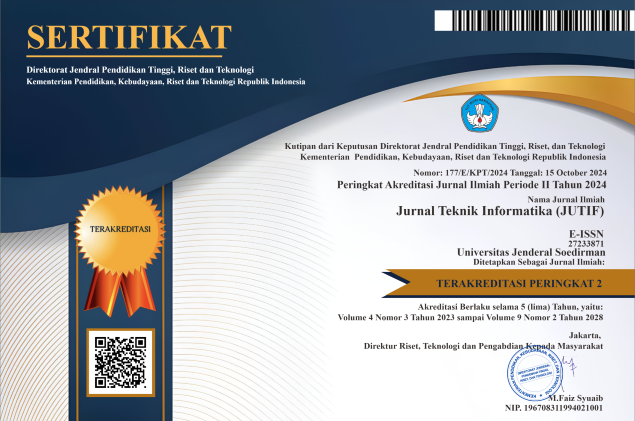ANDROID-BASED DECISION SUPPORT SYSTEM TO DETERMINE APPROPRIATE TIME FOR RICE CULTIVATION IN AGRICULTURAL LAND OF CENGKLIK RESERVOIR
DOI:
https://doi.org/10.20884/1.jutif.2022.3.1.149Keywords:
Android, Cengklik reservoir, crops cultivation, decision support systemAbstract
Cengklik Reservoir is one of the tourism places in Ngemplak, Boyolali Regency, Central Java. This strategic location does not only attract the tourists to visit but is also used by farmers as a source of irrigation for their rice fields. The use of farmland around the Cengklik Reservoir as agricultural land can reduce the problem of drought which has been rarely encountered by farmers. However, another problem arises when the water in the reservoir overflows due to the increased rainfall. This can result in potential damage to paddy fields and might cause crop failure. This study aims to develop the Agraria, an Android-based Decision Support System (DSS) to inform an appropriate period of time for farmers to cultivate crops so that can reduce the risk of crop failures. The system was developed by applying the Mamdani Fuzzy Logic method to process the data taken from public data on weather forecasts of the Meteorology, Climatology and Geophysics Agency (BMKG). The results of the study show that the Android-based decision support system has been successfully developed. The accuracy test was carried out 10 times with an average value of 98.85%. This indicates that the system can be used to help farmers determine the appropriate time for planting so as to avoid the crop failure in the future.
Downloads
References
M. Case, F. Ardiansyah and E. Spector, "Climate Change in Indonesia: Implications for Humans and Nature," Climate change in Indonesia: implications for humans and nature, 2007.
R. Djalante, J. Jupesta and E. Aldrian, Climate Change Research, Policy and Actions in Indonesia: Science, Adaptation and Mitigation, Springer Nature, 2020.
R. O. Mendelsohn and E. Massetti, "The use of cross-sectional analysis to measure climate impacts on agriculture: theory and evidence," Review of Environmental Economics and Policy, 2020.
P. Bergquist and C. Warshaw, "Does global warming increase public concern about climate change?," The Journal of Politics, vol. 81, no. 2, pp. 686-691, 2019.
L. Al-Ghussain, "Global warming: review on driving forces and mitigation," Environmental Progress & Sustainable Energy, vol. 38, no. 1, pp. 13-21, 2019.
S. Chen and B. Gong, "Response and adaptation of agriculture to climate change: Evidence from China," Journal of Development Economics, vol. 148, 2021.
T.-S. Neset, L. Wirehn, T. Opach, E. Glaas and B.-O. Linner, "Evaluation of indicators for agricultural vulnerability to climate change: The case of Swedish agriculture," Ecological Indicators, vol. 105, pp. 571-580, 2019.
C. Amin, S. Sukamdi and R. Rijanta, "Exploring migration hold factors in climate change hazard-prone area using grounded theory study: evidence from coastal Semarang, Indonesia," Sustainability, vol. 13, no. 8, p. 4335, 2021.
S. Ali, Y. Liu, M. Ishaq, T. Shah, A. Ilyas and I. Din, "Climate change and its impact on the yield of major food crops: evidence from Pakistan," Foods, vol. 6, no. 6, p. 39, 2017.



























